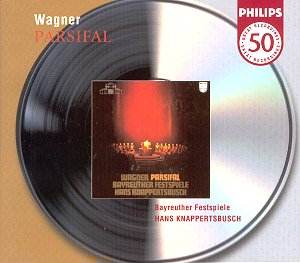 |
Richard WAGNER (1813-1883)
Parsifal (1865-1882) Amfortas - George London Titurel - Martti Talvela Gurnemanz - Hans Hotter Parsifal - Jess Thomas Klingor - Gustav Neidlinger Kundry - Irene Dalis Recorded live at the 1962 Bayreuth Festival. Crotchet AmazonUK AmazonUS Amazon recommendations |
Listening to this year's rather bland Bayreuth Parsifal (conducted by Christian Thielemann) one can easily be forgiven for welcoming this reissue back into the catalogue - this time at mid-price in Philips 50 great recordings series. It is still a stunning achievement - quite magnificently played - with a cast it would be impossible to equal today. Listen to Hans Hotter as Gurnemanz and, to quote Robin Holloway, you have a singer who is 'all encompassing and makes every other Gurnemanz seem generalised'. The detail in his singing is astonishing - febrile, warm, golden in tone and sung with the complete mastery that was evident in his singing of Wotan. It is the finest performance of the role on record and an unforgettable experience.
But this Parsifal was always special for the singing. George London is a fabulous Amfortas (as he almost was on the first post-war Parsifal in 1951) and is nowhere better than in conveying the anguish of his suffering, although eleven years later on his assumption of the role has attained even greater depths of understanding. Jess Thomas gives Parsifal real bite and Irene Dalis (a magnificent Ortrud at Bayreuth in 1962) is a committed Kundry and not nearly so wearing as some on record. Her Kundry must be seen as a formidable exercise in stamina given that at some of the 1962 performances she was suffering from a throat infection - and replaced by Astrid Varnay, at one performance during Act II.
However, it is Knappertsbusch who really carries this performance. Compared with his Parsifal of 1951 (one of the most spacious on record) this 1962 recording (very near the tempi of the first performance under Hermann Levi) has a sense of architecture that is almost seamless in its structure. The Prelude has fluidity like a rolling river, the Good Friday Music a perfect sense of communion and contemplation. Listen to his conducting of the Transformation Music on disc two (tracks two and three) and the sense that this is a conductor who understands the flow of this music is unmistakable (among latter day Wagnerians Simon Rattle adopts a similar approach). Elsewhere (the Kundry/Parsifal scenes in Act II or the Gurnemanz/Parsifal scenes in Act III) he achieves a tautness of tension that has unrivalled colouring in the orchestration. Hear any recording of Parsifal from Knappertsbusch (and there are at least six that have been available) and the overriding impression is of a collage of iridescent beauty - perfectly judged and perfectly balanced. At 3'30'' into disc two (track 3) the high arching string sound is blended with a sonorous projection of the choir that is just fabulous. It has much to do with that unique Bayreuth acoustic but Knappertsbusch's sense of dynamics is unerring (hear Boulez or Cluytens and you get a rather different soundscape). The broad tempos help - and this is why Kna was such a great conductor of this opera. Listen to the horn figuration on disc two, track 8 (1'02'' onwards) and how it emerges from pianissimo wind and string writing to set the perfect dynamic balance. Such beauty of texture makes it even more unfortunate that we do not have a Toscanini performance preserved on record from pre-war Bayreuth - for his was the broadest of all.
The original Philips LPs from this set had a gorgeous warmth to the sound yet this sets remastering gives the performance an entirely different aura. Coupled with Deryck Cooke's magnificent essay on the symbolism of Parsifal the discs are indispensable. Along with Furtwängler's Tristan (due for mid-price release on EMI in September) this is one of the great Wagner recordings of the last 50 years.
Marc BridleSee also review by Tony Duggan